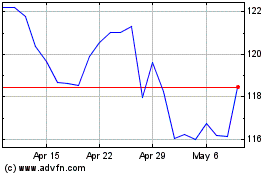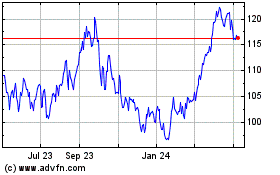Shell to Sell Canadian Oil-Sands Business for $7.25 Billion -- Update
March 09 2017 - 6:41AM
Dow Jones News
By Ian Walker and Michael Amon
LONDON-- Royal Dutch Shell PLC is selling nearly all of its
Canadian oil-sands developments in deals worth $7.25 billion,
largely abandoning a region that has come to symbolize the risks
for big energy companies in high-cost, carbon-intensive sources of
oil.
Shell is pulling out of the Canadian oil sands after its biggest
rival, Exxon Mobil Corp., signaled that production was unprofitable
in the region at today's prices. Exxon removed about 3.3 billion
barrels of oil from its stated reserves mostly as a result of the
oil sands. Norway's state-owned Statoil ASA pulled out of its
oil-sands projects late last year.
Oil-company executives have worried about whether oil-sands
projects will become an albatross. Production in some areas is so
expensive that it can't be justified without oil prices much higher
than the $50 to $55 a barrel that crude futures have traded at in
recent weeks.
Big oil companies piled into Canada's oil sands, based in
northern Alberta, beginning over a decade ago when prices were
soaring over $100 a barrel. But the oil-price crash that began in
2014 made many projects untenable. There are also high upfront
investment costs, tough new regulations on carbon emissions and
limited pipeline access to markets.
In the deals announced Thursday, Shell is selling a host of
oil-sands developments to Canadian Natural Resources Ltd., a
Calgary company with significant oil-sands interests. The deal
includes Shell's Carmon Creek, a project it abandoned in 2015 with
a write-down of about $2 billion as oil prices crashed.
Shell is retaining a 10% interest in one oil-sands project known
as Athabasca, in a new joint venture with Canadian Natural.
Shell is selling its 60% stake in a project known as Athabasca,
to Canadian Natural. The two companies are then forming a
partnership to buy Marathon's 20% stake in Athabasca, allowing
Shell to keep a small piece of its oil-sands production. Shell is
also maintaining some processing facilities in Alberta.
The deals represent a pivot away from Canada for Shell.
Executives have said the company's future now lies in liquefied
natural gas and deep water oil projects. Shell's's roughly $50
billion acquisition of BG Group PLC last year cemented that
strategy.
Shell Chief Executive Ben van Beurden called Thursday's deal "a
significant step in re-shaping Shell's portfolio in line with our
long-term strategy."
Shell and other oil companies have been under pressure from
environmentalists to abandon the Canadian oil sands. Extracting and
refining the region's heavy oil or bitumen is more carbon-intensive
than most other forms of oil development. The Alberta and Canadian
governments have introduced new rules, including a cap on emissions
and a carbon tax.
The sale should help Shell's progress in its plan to sell $30
billion in assets to pay down a huge debt pile accrued to buy BG.
RBC Capital Markets said Thursday that Shell is now about
two-thirds of the way to that debt-reduction goal, which helps
remove concerns about Shell's ability to pay its dividend.
Write to Ian Walker at ian.walker@wsj.com and Michael Amon at
michael.amon@wsj.com
(END) Dow Jones Newswires
March 09, 2017 06:26 ET (11:26 GMT)
Copyright (c) 2017 Dow Jones & Company, Inc.
Exxon Mobil (NYSE:XOM)
Historical Stock Chart
From Mar 2024 to Apr 2024

Exxon Mobil (NYSE:XOM)
Historical Stock Chart
From Apr 2023 to Apr 2024
